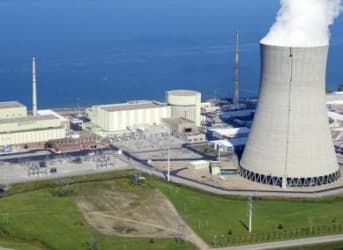The world’s leaders have gathered in Paris to solve the climate problem. The U.S. Department of Energy sees more nuclear power in our future. The British have welcomed French and Chinese nuclear builders with open arms. Are we witnessing the nuclear renaissance? To answer that question, we turn to our world class energy maven, the Question Man.
Q. So, is this it, a nuclear renaissance to combat global warming?
A. Nuclear power as a solution to one problem or another emerges into daylight every few years, sort of like the cicadas under my oak tree. Nuclear plants produce carbon-free electricity. They run reliably. Shouldn’t they be part of the solution?
Q. Well, why isn’t nuclear on everyone’s list?
A. It costs a lot of money to build a nuclear plant— $10 billion or more per unit. That huge bill puts an enormous strain on any utility. A combined cycle gas generator (CCGT), the most efficient generator around, costs one-fifth as much. Admittedly, CCGTs emit carbon dioxide, but at half the rate of a coal-fired plant. Replacing coal with gas can slash carbon emissions, as the British demonstrated in the 1990s. And have you thought of how much extra money becomes available to reduce emissions by not building nukes? Related: Government Influence Over Asset Prices Growing
Q. Replacing existing coal plants with gas generation, though, does not provide new
capacity to meet growing demand for electricity.
A. Where is that growth in demand? Not in the industrialized nations for sure. And most of the others can’t afford nuclear plants, anyway, can they?
Q. In the end, though, isn’t nuclear power economical because low operating costs balance out
high capital costs?
A. Nuclear builders nowadays have trouble raising money on normal commercial terms. They need government subsidies, guarantees or a regulated customer base that has no choice but to pay, and the government has to insure them, too. That would argue that the economics are shaky. The government also subsidizes other energy technologies, though, so it is difficult to compare real economic costs. There are cheaper ways to reduce carbon emissions than nuclear, but with the pros and antis putting out so many bogus numbers, who knows how much cheaper?
Q. Why do governments and utilities favor nuclear power?
A. Nuclear power can’t be held hostage to the whims of offshore dictators or intransigent domestic union leaders. A nuclear project creates lots of jobs and pays lots of taxes. Adding nuclear makes the energy mix more reliable and balanced. Most of those attributes deserve a premium price, but what premium? (Is this selling beluga caviar to someone on a tuna fish budget?) Utilities, with their peculiar regulatory regime, have an incentive to pick the most capital intensive solution because they make more money when they invest more in rate base and what is more capital intensive than a nuclear power plant? Related: 5 Reasons Why Coal Is Being Killed Off
Q. Can climate change negatively impact nuclear generators?
A. Nuclear owners pick sites the way Florida hotel owners do. They like waterfront properties, not for the view, but for the water. Climate change could raise sea level and change river flows, which would cause enormous inconvenience or worse. But the specter of the storm surge that comes with a hurricane is more frightening—a massive wall of water that could cut off external power sources that the nuclear plant needs to cool its cores, and render inoperable the diesel backup generators that kick in when the plant loses external power. The tsunami that breached the sea wall at Fukushima Daiichi plant in Japan knocked out the diesel generators and the rest is history, isn’t it?
Q. Isn’t it risky to depend on natural gas, given its price volatility?
A. Sure, but who wants to depend on natural gas? Use it to phase out coal and then as a backup for renewables. Would gas’ price volatility matter under those circumstances?
Q. What about nuclear waste?
A. Listen, Congress jammed Yucca Mountain down the throats of the good people of Nevada, another set of politicians stopped the project, and it will take still another set to get it going again. Until then the waste will stay above ground somewhere. Do you have a better idea? Related: How Far Will Oil Sink Before Christmas?
Q. Why do people object to nuclear power?
A. What difference does it make? If you have a product that a large part of the population and the political leadership distrusts and it costs a lot of money, and there are substitutes available, what’s the point of pushing it? “Eat your spinach, it’s good for you.” Is that your sales pitch?
ADVERTISEMENT
Q. So, is it hopeless?
A. No. Building those giant, seemingly uneconomical facilities doesn’t make a lot of sense. Small scale, modular plants might. Permanent waste disposal sites and a high carbon tax would do a lot for nuclear power. So might more research and development. Keeping the existing nukes running as long as possible reduces our carbon emissions. But why put money into new nukes when so many alternatives exist?
Q. Thank you, Mr. Question Man. Your answers were very helpful.
By Leonard Hyman and William Tiller for Oilprice.com
More Top Reads From Oilprice.com:
- Finally Some Good News For The U.S. Oil Industry?
- Oil Markets On Edge About Fed’s Decision Tomorrow
- $30 Oil Will Accelerate Much Needed Rebound



















A reactor used to make electricity runs for 18 months to 2 years between refuelings. An individual fuel rod will stay in the reactor for 3 cycles since only ? of the fuel rods are exchanged at each fueling, so one fuel rod stays in the reactor 4.5 to 6 years. In that time, many trans-uranic elements are created. In that time, Pu239 absorbs extra neutrons, becoming Pu240, Pu241, Pu242, 95americium243, 96curium247, 97berkelium247, 98californium251, 99einsteinium25, 100fermium257 and so on.
All of these higher actinides are good reactor fuel but bad for bomb making.